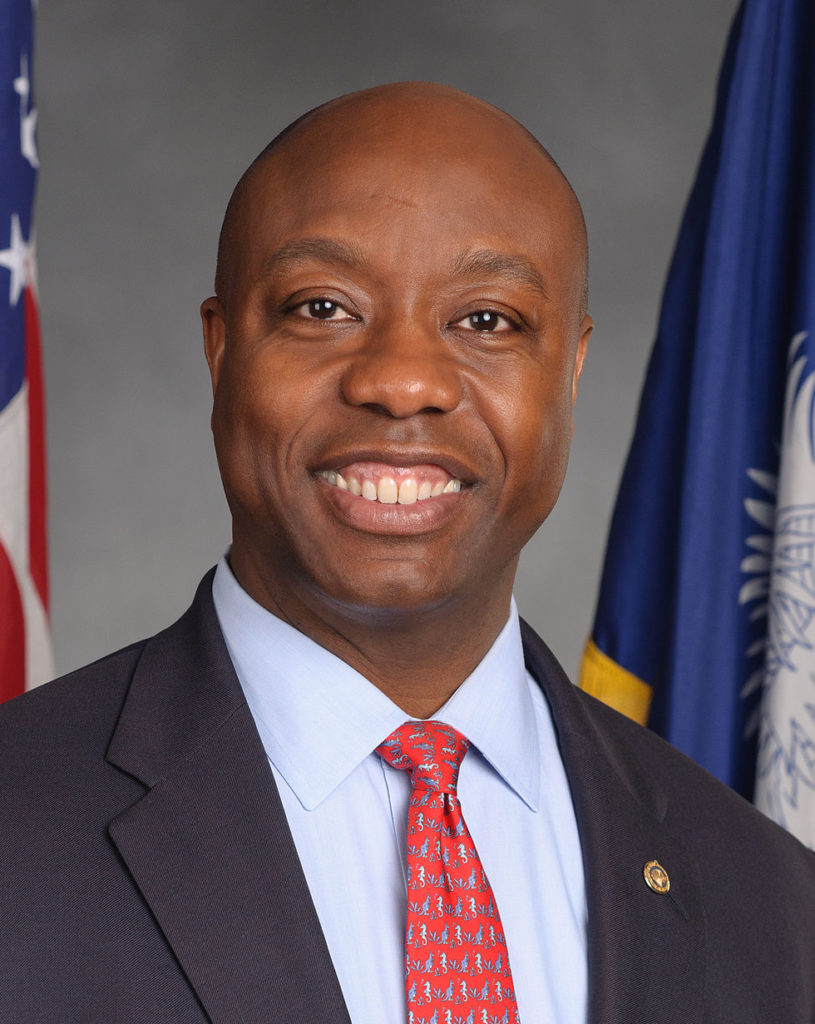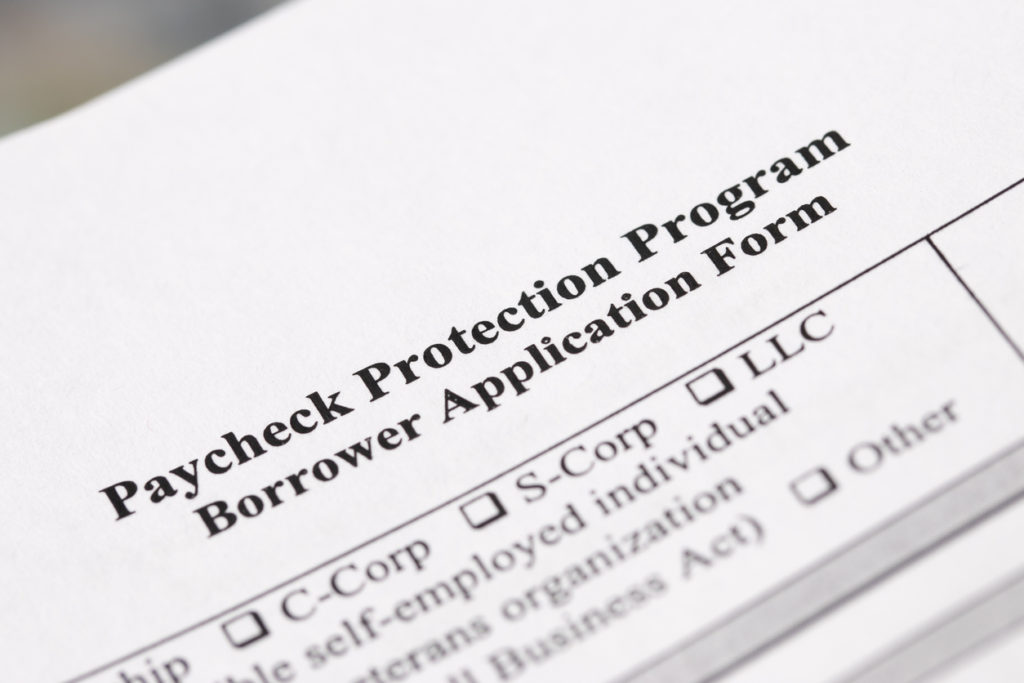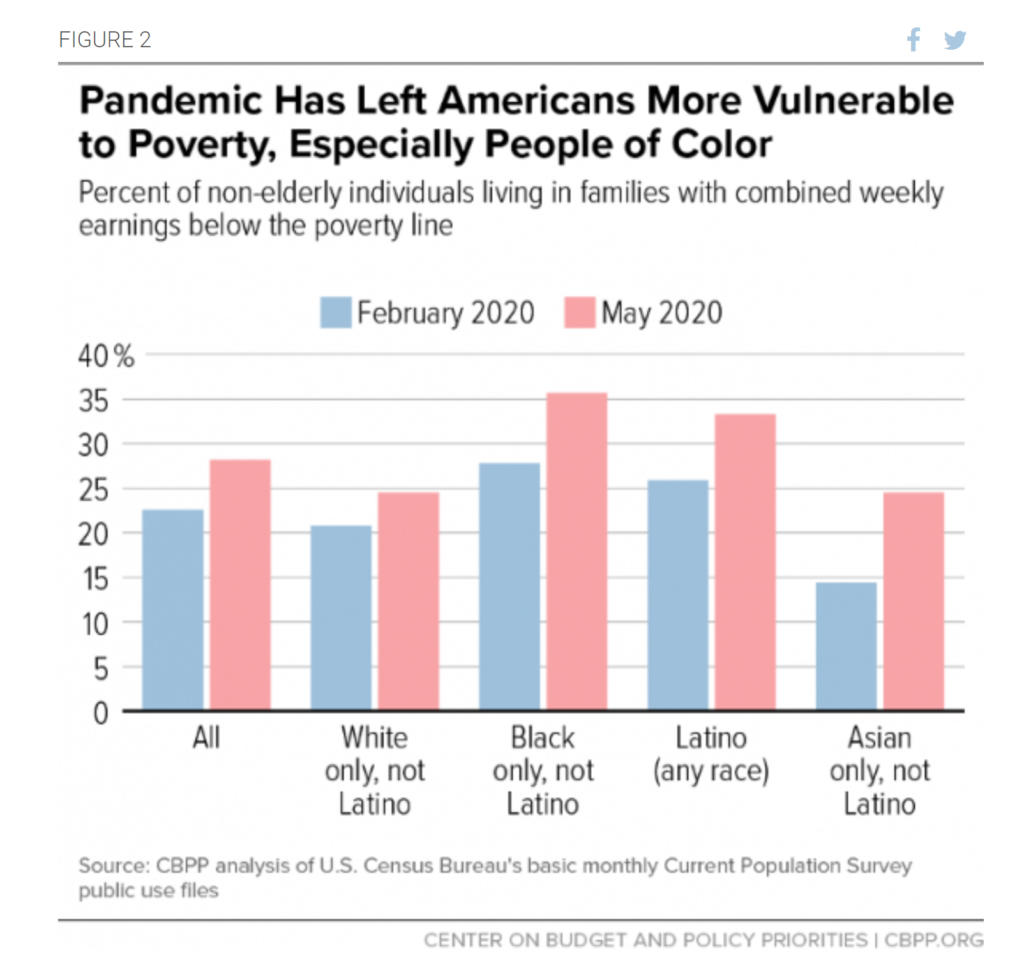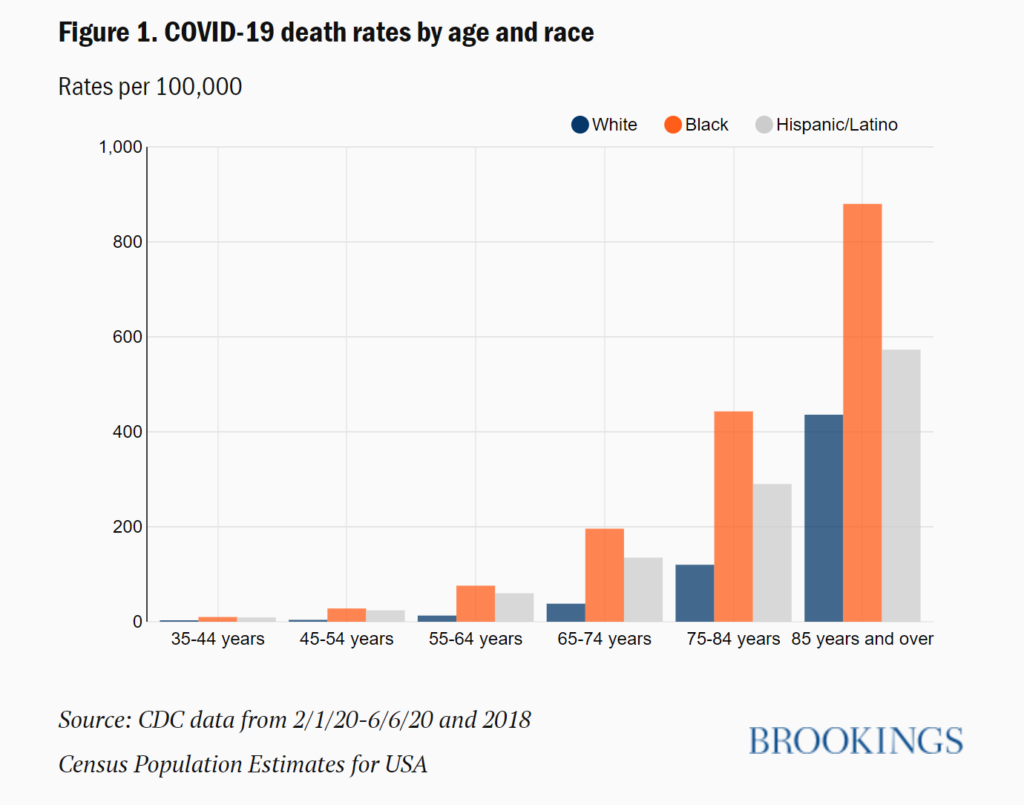
June 23 COVID-19 Policy & Black Communities Roundup
Republicans’ Police Reform Bill Hangs on a “Poison Pill”

Led by Senator Tim Scott (R-SC), Senate Republicans unveiled their police reform proposal last week. The bill focuses on data collection, training, and officer misconduct and transparency. It follows a bill by House Democrats in response to weeks of protests and calls for reforms in the aftermath of the death of George Floyd. The GOP bill aims to incentivize police departments to ban chokeholds and includes new requirements on reporting the use of force by police and the use of no-knock warrants. The White House has announced its support of the GOP proposal.
Debate on the issue is expected this week as both the House and Senate are in session. The elimination of qualified immunity for police officers—deemed a “poison pill” by the White House and some Senate Republicans—has become a topic of division among GOP legislators. The Democratic bill would scale back the legal doctrine, which shields police officers from civil lawsuits. While GOP legislators are against eliminating the doctrine, some are open to changes as part of a larger bipartisan police reform package.
The Federal Reserve Calls for an Inclusive Recovery
Last week, Federal Reserve Chairman Jerome Powell urged policymakers toward an inclusive recovery and praised Atlanta Federal Reserve Bank President Raphael Bostic for a statement supporting Black Lives Matter and calling for the Federal Reserve to help reduce racial economic inequality. Federal Reserve officials are calling for Congress to increase both short and long term investments in the economic recovery.
Congress is divided over whether to extend expanded unemployment benefits provided for by the CARES Act which are set to expire on July 31. Last week, Federal Reserve Chairman Powell urged Congress to continue enhanced unemployment insurance “in some form.” Republicans are against continuing the distribution of an additional $600 in weekly benefits to all unemployment recipients due to concerns it would be a disincentive to seeking employment as the economy reopens. Democrats argue that the extended benefit is a critical source of relief for people living in poverty, and that eliminating or reducing it might compel people to return to work regardless of safety concerns. The Federal Reserve reports that the expiration of expanded unemployment insurance benefits will leave many families unable to afford “rent, food, utilities, and other payments.”
Small Businesses Continue to Receive Attention from Policymakers
In response to demands from U.S. House Coronavirus Select Committee Chair and Majority Whip James E. Clyburn and other Members of both parties of Congress, the U.S. Small Business Administration and Treasury Department announced that they will provide data on which businesses borrowed PPP money. The disclosure will apply to companies that received loans of more than $150,000 from the program.
Last week, the SBA made additional changes to the Paycheck Protection Program in response to lawmakers’ calls to streamline the loan forgiveness process. The SBA released a new, shorter “EZ” loan-forgiveness application form for certain self-employed or small business borrowers with no employees.

Debates continue over whether to continue to extend loans under the PPP, which are set to expire on June 30, with increasing concerns that the stimulus provided through the program will fall short of what is needed to sustain small businesses and support economic recovery. These concerns are driving calls from small business groups and lawmakers for long-term relief to address needs beyond the original PPP purpose of delaying mass layoffs in response to the pandemic. Solutions being discussed include eliminating the prohibition on businesses getting a second PPP loan and designing future relief to target minority-owned businesses largely left out of the process.
Of the total $660 billion allocated as Paycheck Protection Program Funds, as of June 19, $514.5 billion in loans had been distributed and the average loan size was $110,543.
Last week, the Federal Reserve launched the Main Street Lending Program, a separate relief effort from the U.S. Small Business Administration’s PPP loans. Aimed at small and mid-size businesses, the $600 billion low-cost loan program got off to a “rocky start,” with small businesses citing difficulty in finding banks that will extend loans through the program. A Brookings Institution paper released last week called for a number of changes to the program to increase its usage.
Last week, the Congressional Oversight Commission established by the CARES Act issued its second report, which provides an update on the $500 billion allocated to the Treasury for lending and other investments.
For more on Congress, police reform and COVID-19 this week, see the National Urban League’s Washington Bureau Insider.
Economic Studies & COVID-19
Unemployment claims remain high with over 1.5 million initial claims for unemployment insurance benefits filed in the week ending June 13. An additional 760,000 new claims were filed for Pandemic Unemployment Assistance, which is offered to self-employed workers and others who are not traditionally eligible to receive unemployment insurance. Prior to the coronavirus pandemic, the highest single-week high for traditional unemployment insurance benefits was 695,000 claims in 1982.
The Washington Center for Equitable Growth issued a statement endorsed by over 150 economists, including former chairs of the Federal Reserve, former members of the White House Council of Economic Advisers and others, insisting that Congress pass a “multifaceted relief bill,” which among other things would “avoid prolonged suffering” to the Black, Latino, and Native American communities that have been disproportionately affected by the public health and economic crisis caused by COVID-19.

The Center on Budget and Policy Priorities analyzed new Census Bureau data that shows that the number of non-elderly Black individuals living in families with below-poverty earnings rose by 2.7 million, an increase of 27%, from February to May during the coronavirus pandemic. Comparatively, Latino and white individuals in the same category rose by 4.1 million (29%) and 5.5 million (17%), respectively. The New York Times highlighted findings from two reports showing that without expanded federal aid, federal poverty rates would be much higher.
The National Employment Law Project (NELP) urges states and local governments to protect workers and prioritize workers of color as COVID-19 cases rise in many states and the federal government has neglected to implement certain requirements that would protect workers from COVID-19. The Economic Policy Institute commissioned survey questions in a poll, and found that “71% of Black workers employed outside their home are fearful of bringing the coronavirus home, but only 41% receive hazard pay.” The Economic Policy Institute continues to push for policies focused on safety protections and extra compensation for workers.
The National Women’s Law Center issued recommendations for employers to ensure gender and racial equity in the workplace as part of their COVID-19 response. Suggested policies include creating good jobs with a living wage of at least $15 per hour, providing paid sick time and job flexibility, and maintaining a workplace that is free of discrimination and harassment.
The Urban Institute found that at least one person lost a job in 20 percent of all renter households. To alleviate the cost burdens that were exacerbated for these households, they urge policymakers to complement unemployment assistance with rental assistance.
David J. Byrd has been appointed as the National Director of the U.S. Department of Commerce’s Minority Business Development Agency (MBDA), which is dedicated to the growth and global competitiveness of U.S. minority-owned businesses. He will oversee the Agency’s initiatives, policy agenda, and federal grant funding.
The New York Times reported on the challenges small businesses in Black communities may face, citing a JP Morgan Institute data showing that businesses in Black neighborhoods may run out of cash faster than those in Hispanic and white communities. Black businesses have faced difficulties accessing relief. According to the article, “only 2 percent of a $20 million city-wide small business loan program went to businesses in the Bronx, the New York City borough with the highest share of Black people…57% went to Manhattan businesses.”
Political Studies & COVID-19
On Monday, June 22, President Donald Trump tweeted an article that references an interview that Attorney General William Barr did with Fox News Channel’s “Sunday Morning Futures,” in which he stated that mass scale mail-in voting “absolutely opens the floodgates to fraud.” President Trump later tweeted claims that foreign countries and others may interfere in the upcoming election by printing millions of mail-in ballots. Several voting experts replied to the President’s claims stating that voter fraud is very rare.
As Kentucky prepares to host its primary on Tuesday, June 23, fewer than 200 polling places will be open for voters, which is down from 3,700 in a typical election year. Jefferson County, KY—which with a population of 767,000 is the state’s largest county—will only have one polling location. About 20 percent of the residents of Jefferson County—which includes the city of Louisville—are African American, and the county is home to half of the state’s Black population. While a lawsuit filed by Republican State Rep. Jason Nemes and voters from Kentucky’s Jefferson, Fayette, and Kenton counties sought to add more polling places, a federal judge denied this motion on Thursday night. In response, Lawyers’ Committee for Civil Rights Under Law President and Executive Director Kristen Clarke said, “It’s outrageous that officials are seeking to hold in-person elections in a single location. It’s as if Kentucky failed to follow the crisis that unfolded in Wisconsin and Georgia, where officials were woefully unprepared for the turnout on Election Day.”
In an attempt to avoid in-person voting, thousands of Kentucky voters requested mail-in ballots, but some still have yet to receive them just days before the election date, when ballots must be postmarked.
As of the latest Centers for Disease Control (CDC) report released on June 15, Black Americans accounted for 22% of almost 600,000 coronavirus cases with demographic characteristics. Of the 1.3 million laboratory-confirmed cases, only 45% have known racial data.

Pointing out that racial disparities of COVID-19 deaths differ drastically by age, the Brookings Institution examines what other factors are behind the race gap. “Among those aged 45-54, for example, Black and Hispanic/Latino death rates are at least six times higher than for whites.”
A team of analysts and researchers at The Surgo Foundation examined key factors driving African American vulnerability to COVID-19 and provided important concepts to consider when designing targeted interventions for Black communities to include acknowledging the need for community-specific approaches; tackling by-products of discrimination, giving extra support to rural areas, and prioritize testing, contact tracing, and supported isolation in the most vulnerable Black communities.
In the aftermath of massive protests to the death of George Floyd, many cities and states around the country began offering free COVID-19 testing at sites near where protests occurred. (See Wired and Boston Globe). Early testing data suggests fears that protests might lead to an increase in COVID-19 cases may have been overblown.
Organizing
Black Voters Matter Fund hosted virtual town hall meetings in Pennsylvania, Georgia, South Carolina, Florida, and Tennessee to discuss engaging Black voters, voting information, and mutual aid efforts.
SouthStrong, a collection of southern organizations and scholars issued a statement calling for an equity-focused response to COVID-19.
Benton Institute for Broadband & Society, Common Cause, MediaJustice, the National Hispanic Media Coalition, New America’s Open Technology Institute, Open MIC (Open Media and Information Companies Initiative), Public Knowledge, and UnidosUS are urging the Federal Communications Commission to immediately increase voice and broadband support through the Lifeline program to protect and promote civil rights for marginalized and impacted communities of COVID-19. In March, the Joint Center joined over 200 organizations in signing a letter requesting the FCC to provide emergency support for the Lifeline program.
Events
Upcoming events include “Surveillance Pandemic” (Mijente, June 23); “Supporting Black and Non-Black Workers of Color in the Age of COVID-19” (Associated Black Charities, June 23) “Closing the Home Learning and Homework Gap” (New America, June 25); “What Residents Need To Know: A Chat with the Indiana Black Legislative Caucus” (New America, June 25); “Healing in Action” (W.K. Kellogg Foundation, June 25), “Ongoing Uncertainty in the Hospitality Industry” (Brookings, June 29); “Latinx Economic Resilience in the Time of COVID” (New America, July 7); and “Caring for Borrowers Outside the CARES Act: A Closer Look at Privately Held Loans” (Urban Institute, July 15).
Last week’s events were held by Black Communities: A Conference for Collaboration, Brookings, Congressional Black Caucus, Congressional Black Caucus Foundation, National Law Center on Homelessness & Poverty, National Urban League, New America, Restaurants Opportunities Centers United, and Third Way.
Community Organizations
Decarcerate PA is calling on Mayor Kenney and City Council to swiftly shut down the Philadelphia Detention Center. More than 20 percent of the people detained at the Detention Center have tested positive for COVID-19.
Englewood Arts Collective provided micro-grants to 115 creatives following a mutual-aid initiative for Chicago’s South Side artists during the pandemic.

